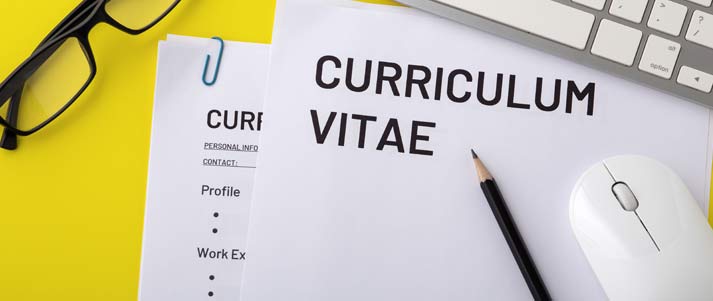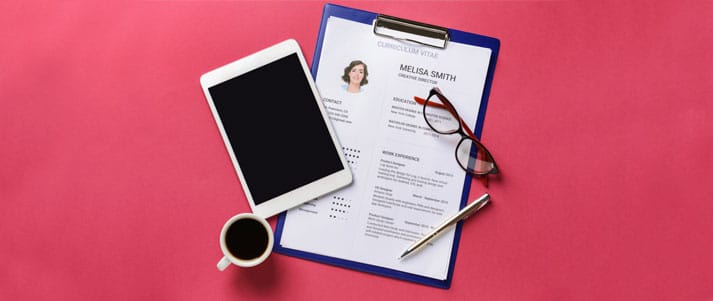How to write a great cover letter
Competition is tough, so how do you make yourself stand out from the rest of the job-seeking crowd? With an amazing cover letter, of course!

Credit (left): Wayhome Dtudio, Credit (right): My Images Micha - Shutterstock
Don't get us wrong, having a great CV is incredibly important in landing your dream job. But what if employers don't even get as far as seeing yours?
Unfortunately, many companies confess that if they're presented with a sub-par cover letter, they won't even look at the candidate's CV. As your CV is just a list of your experience and achievements, it's cover letters that really impress employers. It's your chance to show them a bit of your personality.
This simple A4 page acts as a chance to sell yourself in a few sentences. You could give off a good first impression before you've had a chance to meet face-to-face.
What's in this guide?
What is a cover letter?

Credit: everydayplus – Shutterstock
A cover letter is a document that you send with your CV as part of a job application. Rather than a CV, which is tailored to your skills and experiences, a cover letter is aimed specifically at the job you're applying for.
It's a chance to show a bit more of your personality and explain why you're the best person for the job. While it's not always required when applying for jobs, it's a good idea to add one anyways. Since it's often the first thing a company sees before looking at your CV, it can make or break your application.
Tips for writing the perfect cover letter
These are the best ways to write a cover letter:
-
Research the company and industry
Just as you would do if you were preparing for a job interview, you should thoroughly research the company and the role before writing your cover letter.
What exactly will you be doing? What's the company's vision? Who are their competitors? Who are their customers/audience?
Once you're armed with this knowledge, you'll be amazed at how much easier it is to get started. While reading, take notes of the most important info and see how it relates to the job description.
-
Tailor your cover letter to the job
Cover letters need to be tailored to the job you are applying for. Don't send the same cover letter out over and over again (employers can sniff out a copy-and-paste job from a mile away).
When writing your cover letter, always have a copy of the job specification next to you. Remember to keep checking to make sure everything you're writing is relevant.
Try to find a name you can address in your cover letter. Most job postings will tell you who to contact. If not, do some research – this can make a big difference.
If you're unsure, you can check LinkedIn, or call up and ask. Someone should be able to give you a name, and it'll show that you've gone the extra mile.
Posting your application? Then make sure you include your own address as well as the company's on the letter. Check out our graduate cover letter template below for the correct layout.
Bonus tip: If you're addressing your letter to a named person, sign off with "Yours sincerely"; if the name of the addressee is unknown, go for "Yours faithfully". You're welcome!
-
Be formal but friendly
If an employer has asked for a cover letter, they're looking for the candidate to demonstrate they can communicate and present themselves professionally on paper.
As such, keep it relatively formal but don't be afraid to let your personality shine through a little bit too (being too formal can stifle this). The job description is normally a good indication of the sort of tone you should be using.
Note that a cover letter to a startup company is likely to go down a bit better if it's more relaxed (and even a bit fun), whereas a law firm would be looking for something a little more formal. The key is to know your audience.
And always make sure you triple-check for spelling and grammatical errors. Check that your spellchecker is activated, put your letter through an online spellchecker or add Grammarly to your browser.
-
Keep it short and sweet

Credit: Pixel-Shot – Shutterstock
Resist the temptation to write your life story, you're not writing an essay!
People often make the mistake of using a cover letter as a space to elaborate on what's already in their CV. This shouldn't be the case. While your cover letter can refer to some of the info in your CV, it's better to keep it short, sharp and convincing. That way, the reader is pulled in and wants to read your CV to learn more.
How long should your cover letter be?
Always stick to one page, formed of about three or four paragraphs. We'll cover the structure in more detail below.
-
Choose the correct format
If the job spec suggests emailing your cover letter, put the text in the body of the email rather than attaching it as a separate file.
Attaching a separate file is an additional step for the employer to go through before getting the details. You should make it as easy as possible for them.
But remember that including addresses and letter layouts doesn't apply to email format.
-
Clean presentation
Make sure you spell check and read your cover letter aloud to yourself a few times before sending it. You'll be surprised at how much easier it is to spot awkward sentences if you say them out loud rather than read silently. With hundreds of letters to go through, binning those with mistakes is a simple way to decide who's in and who's out.
Regarding presentation, less is more. Stick to smart and simple.
When sending letters via email, keep the text looking clean. No Comic Sans, no word art, no images and no colours. Check the spacing between lines and paragraphs and make sure everything looks uniform.
-
Avoid cliches
Use your own words and your passion and excitement will shine through. If you're using a big word when a small one will do, go for the smaller one. If used correctly, they're just as powerful.
Rather than simply saying that this is your "dream job", take examples from your personal experience which demonstrate your commitment to the cause.
How to structure your cover letter

Credit: Alexxndr – Shutterstock
The easiest way to approach a student or graduate cover letter is to consider it as four separate sections:
The introduction
Keep the introduction brief – one or two sentences. Mention the job you're applying for, as well as the fact that you were excited to come across the vacancy and have the opportunity to apply.
Then mention who you are (as in "a recent graduate" not "my name is..."). You can also point out that you've attached your CV if requested.
Try and catch their eye with the first line by injecting some enthusiasm and personality. The more original you sound, the more likely they are to keep reading.
Example of how to start a cover letter
I'm reaching out with great enthusiasm in response to your vacancy for Junior Marketer at Butler's Bakes. As a recent Marketing graduate with a serious passion for cake (both making and eating!), I was really excited to come across this vacancy.
Explain why you love their company
Now it's time to explain why you're interested in them specifically. This is where you prove that you haven't just copied one of the 8,327,507 student cover letter examples online, but have taken the time to think about why you want to work for this company. Show them that you aren't just desperate to find a job.
Again, make sure you do some serious research at this stage. If you have any links to the company or have acquired any lesser-known information about press coverage they've had, this can only impress.
Try to mention something that shows you have an awareness and understanding of the company beyond stating the obvious.
For example, if you're applying for a graduate job at an accountancy firm and you noticed that they're one of the top graduate employers in the UK – mention it.
Try something like:
As one of the UK's top graduate employers, I admire the company's efforts in creating opportunities for young talent in what is an increasingly competitive graduate job market.
Explain why you're the best candidate for the role
After that, write about what you can offer them. This is a chance to bring up some qualities you know they are looking for and that you can prove you have.
Highlight your key skills – but only the relevant ones. The best way to tackle this is to write down a list of three key skills mentioned in the job description. Then, have a look over your CV to find things that demonstrate you have those skills.
If you're struggling, check out the list of skills that employers ask for the most. Even if they haven't mentioned it in the job ad, these skills are important in most positions.
Remember that no matter how impressive it is that you spent six weeks doing Camp America, there's no point in mentioning it unless you can show a direct link between that and something that they're looking for in this position.
How to end a cover letter
Keep it short and sweet.
Wrap things up by saying something on the modest side, along the lines of:
I'd love to have the opportunity to become part of the team at Butler's Bakes, and I'm confident that given the chance to meet with you, you'd deem me a great fit.
Thank them for taking the time to consider your application and now for the big finale: the ultimate "Yours sincerely/faithfully".
Leave five spaces for your signature and then type your full name underneath. No kisses!
Then all that's left to do is proofread and ask any friends or family to check it before sending it off.
Free cover letter template
We realise that you might want to put in as little work as possible, and even this guide might be a bit too much.
That's exactly why we have taken the time to make you a cover letter template that you can download and use.
And when you do get hired, what then? Look no further – we've got a whole guide on what to expect from your first job.








